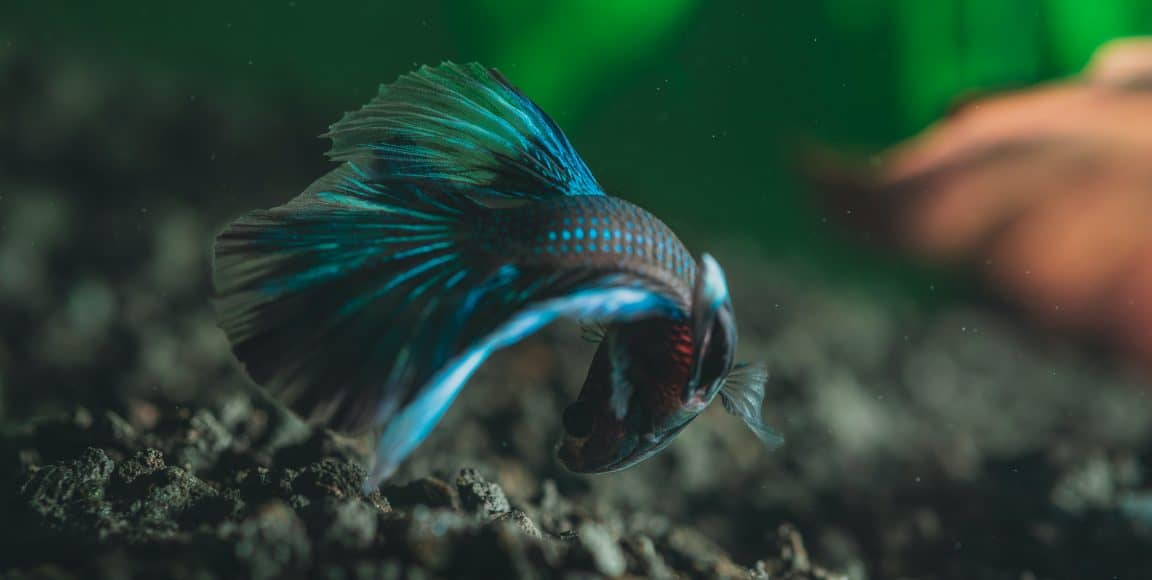Last Updated on March 1, 2021
Betta fish are live animals and will need food to survive. Your betta will not store the food forever inside itself. The waste product of food digestion is poop which comes out through the anus of the fish. Since bettas live in water, this will naturally pollute your betta fish tank. This is the reason regular aquarium maintenance is important.
Poop will accumulate in your betta fish tank if you do not clean it regularly. This gives us reason to ask “How often do betta fishes poop?” Knowing our betta fish’s poop habits will put our minds at ease and let us come up with a schedule to prevent too much poop from accumulating.
Table of Contents
How often do betta fish poop?
Feeding fish is an enjoyable moment for fish keepers. Knowing that your fish is healthy gives a sense of accomplishment. bettas will take in food through their mouth and grind it with their teeth. They swallow it and it enters their stomach which is roughly the same size as their eye. This continues to their intestines where absorption takes place. Whatever is left of the food goes out through their anus.
Bettas will poop as often as needed to expel digested food. A regular feeding schedule is important to let your betta fish have a regular bowel movement schedule too. Just like you and me, it is a natural process of health that we have to go through daily.
What does betta poop look like?
You may not always see your pet betta fish poop but you can see these poop accumulate on the bottom of your fish’s tank.
It may look like small round clumps that settle in one area. It may look like uneaten food pellets. The color is usually brown. Betta fish may have a certain area to poop. Such as behind decorations or near some plants. This will give you a splendid idea of where to concentrate when using your gravel vacuum or water siphon when doing maintenance.
Is too much poop in your betta fish’s tank bad?
Too much poop that accumulates in your betta’s tank is bad for your betta fish’s health. Water flows and has such a huge volume in the vast rice fields, streams, and irrigation canals of Thailand in Southeast Asia where the betta fish originated. The water inside the aquarium of your Betta fish isn’t renewed constantly unlike in the wild habitat of betta fish. This is a problem especially if there is too much poop.
Poop will decompose and release ammonia into the water of your betta fish’s home. Ammonia spikes are one reason fish die. When testing the water of your fish tank, ammonia should always be at 0. Ammonia will lead to burns on your fish’s gills and internal organs.
A good thing to note is that having a cycled tank with a good filtration system will help you combat the harmful effects of ammonia. Good bacteria will eat ammonia. The filter will also suck up waste and uneaten food acting a mechanical filtration. Filter media have a huge surface area for good bacteria to live in which deals with biological filtration.
Related: Do Bettas Like Light? All Your Questions Answered!
What can betta fish poop tell you about your pet?
It’s fine to not wait for your betta fish to poop but what is more important to note is the consistency of its poop which may have telltale signs about its health. Dangling stringy poop forming a long tube can be a sign of overfeeding and constipation. Stringy white poop dangling from your betta’s anus is a sign that your it may have internal parasites.
Constipation shouldn’t be ignored!
Seeing your betta fish bloated and swollen is not a pleasant sign. Long-term effects may be swim bladder disease and dropsy. Swim bladder disorder happens because the betta’s digestive tract is full and constantly presses on the swim bladder. Prolonged pressure can lead to the swim bladder to malfunction which will make your betta have swimming and buoyancy issues.
Another troublesome condition that can occur because of prolonged constipation is Dropsy. A poor diet of betta fish will lead to less movement in its digestive tract. Remember that bettas are carnivorous fish. Feeding them with starchy filler based regular fish food will lead to this accumulation of food. Dropsy is a secondary symptom of a lot of diseases. Your betta will look bloated and its scales will look like it’s pointing out giving it a pinecone-like appearance.

How to avoid constipation of your betta fish?
1. Avoid overfeeding
Overfeeding causes your betta fish to eat too much. This can lead to constipation and bloating. This also causes uneaten food to drift to the bottom of your fish tank where it decomposes and releases Ammonia. Feed your betta twice a day with a serving it can eat within 3 minutes. That would be approximately 2 to 3 pellets. Put 1 pellet at a time and make sure you see your betta eat it. Remember that your betta’s stomach is just as big as it’s the eye.
2. A varied carnivorous diet is the way to go
Brine shrimp, daphnia, mosquito larvae, frozen bloodworms as treats, and pellets made specifically for a betta are the best options to feed your betta. This is because bettas are carnivores. It is important to ask your local fish store sellers if they can provide you with food for your betta.
3. Good water quality
The water in which your betta lives should have a neutral pH of 7, a temperature between 78 to 80 degrees Fahrenheit or 25 to 27 degrees Celsius, and it should have been treated with a water conditioner to remove any traces of chlorine, chloramine, and heavy metals.
4. Get a bigger tank
A tank that holds a larger volume of water will have fewer chances of a sudden change in water parameters. Sudden fluctuations in water parameters may bring a lot of stress to fish. Ammonia poisoning is also faster in tiny containers because there is not enough water to dilute harmful substances. Stress decreases the fish’s immune system’s capacity to ward off disease.
Related: Betta Stress Stripes: Everything You Need to Know
What to do if my betta has constipation?
There has been much discussion regarding these steps. We base most on the experience of long-time enthusiasts but it would be best to consult with a veterinarian who specializes in fish care. If these recommendations do not seem to work, then seek professional advice.
- Make sure that the temperature is optimal for a tropical fish tank. 78 to 80 degrees Fahrenheit or 25 to 27 degrees Celsius is the preferred temperature for bettas. Use a heater to achieve this. Low temperatures will slow your betta’s metabolism which may lead to its constipation. High temperature speeds up metabolism. Try to stay on the higher end of the optimal range to give its metabolism a boost.
- Let them fast for 3 days to let all the food in its system to pass. You can wait for long since a betta can live without food for a week. This will usually ease constipation and bloating. betta fish can live for 7 days without food. Longer than this then it will start tapping into its fat stores. Don’t stop feeding your fish for over 7 days. If possible, consult with a veterinarian if the condition doesn’t resolve in a week.
- Give your betta exercise by showing its reflection in a mirror. Gill flaring and fin fanning will also trigger poop time. Let it do this for around 5 minutes a day. This is their territorial instinct kicking in when they see the reflection. They will think an intruder has entered their territory. Flaring needs energy expenditure and this will let your betta use the energy from what it has consumed or put in-store in its body.
- Try feeding a pea. Put a frozen pea in hot water. Let it cool. Peel the covering and feed half to your betta in the morning and another half at night. Check within the next 24 hours for poop. A pea can be fed every two weeks just to encourage good digestion.
- Feed daphnia if your fish refuses peas.
What to do if my betta has stringy white poop?
Is your betta lethargic? Check the water temperature. Make sure it is in the correct range suitable for a betta. Be on time with water changes and cleaning your aquarium. A friendly environment is important for your fish’s health.
Is your betta eating during mealtime? Maybe it doesn’t have an appetite, or it doesn’t like the food you are giving it. Try changing your fish food. Having a varied diet may also prevent this from happening.
Could the food be expired? Refresh your stock. Expired food may have lost its nutrients and what you are feeding to your pet isn’t optimal for its health.
Does the stringy white poop always occur? See how often this happens. Maybe your pet didn’t have a good bowel movement if it was just for a day.
If this happens all the time, then you can consider asking your local fish store for treatment options that can be sold such as medication. Be sure to follow the manufacturer’s instructions when using any substances for your aquarium. Treatments may take a week to finish so make sure to stick to the plan and never skip a day of dosing.
If you are still in doubt, then contact a veterinarian who specializes in fish care. They may give a more thorough diagnosis regarding your pet’s condition and provide a better solution or cure.
The health of your betta can be assessed by looking at its poop. It is normal for betta fish to poop daily especially if it has a regular feeding schedule. You can somehow gauge if your betta is healthy by observing its bowel movements and poop consistency. This is like when doctors ask for a stool examination. Strive to maintain a suitable environment, proper diet, and enough exercise for your pet. A healthy betta is a happy betta and pooping well is a part of a healthy life.
